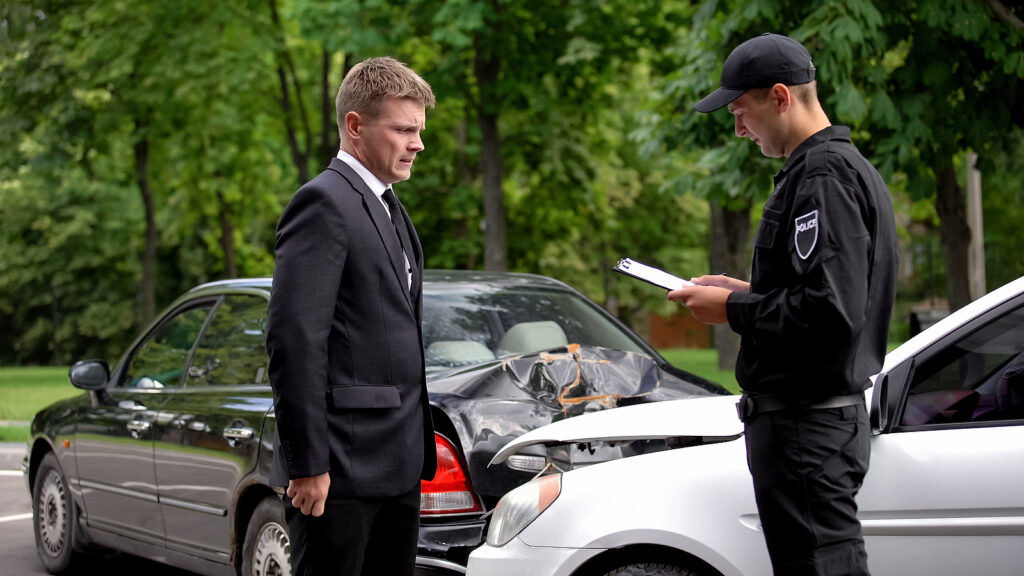You Should Always Make a Police Report After a Car Accident
Many people assume that the first step to take after a car accident is to contact their insurance company. But depending on the details surrounding the accident, in most cases, the first call to make is to the local police. Filing a police report after a car accident is one of the most responsible protections you can take. Having such documents on record can better streamline the claim and settlement process.
Continue reading to learn what you need to know about making a car accident report in Indiana, including who to contact if you were seriously injured by a negligent driver.

Indiana Laws and Procedures for Car Accident Reporting
In many cases, the law allows drivers to decide on their own if they want to contact the police after a car accident. In more serious cases, the law mandates that law enforcement is called to the scene. These laws and regulations vary among states. Here in Indiana, drivers are required by law to contact local law if certain conditions exist.
Indiana drivers involved in a car crash must call the police to report the accident if:
…the property damage is $1,000 or more.
…anyone dies or suffers an injury.
…the insurance carrier requires it in all cases.
…the other involved vehicle is unattended.
–Indiana Code § 9-26-1-1.1
Failing to make a police report after a car accident that meets these car crash reporting rules can possibly result in criminal penalties, as well as vehicle registration revocation, fines, and loss of driving privileges.
How to Make a Car Accident Report in Indiana
It is always best to report all car accidents to the police as this will allow you and your insurance carrier to obtain necessary documentation and information regarding both drivers. You should call 911. You can also contact the local police department or sheriff’s office in the municipality of your accident and sometimes they will have non-emergency numbers you can call to have an officer come out and make a report.
Following a police report, you would contact your insurance company to commence the claims process. Within 10 days’ time of the accident, you and the other driver or vehicle owner are required to have your respective insurance carriers electronically file a Certificate of Compliance with the Indiana BMV, which verifies that both parties have state minimum insurance coverage. Failure to do this can result in your driver’s license being suspended for a time.
The Importance of Making a Police Report After a Car Accident
Making a police report at the scene of a car accident is important for many reasons, whether the law mandates it for your particular incident or not. This is especially true for car accidents that result in bodily injury. For starters, your injuries may not manifest until later. These are known as late-appearing car accident injuries or an onset of symptoms. Delayed onset of symptoms is very common.
Additionally, your property damages might be more severe than you expected them to be, or worse, the other party involved could make false claims against you in an effort to evade liability for the accident. This is especially frustrating when you are not at fault in causing the car accident. Police reports can protect you from such complexities that can occur during the car accident claim process.
After being involved in a car accident in Indiana, not only is it encouraged to call the police to the scene so the officer can do his own police report, but it is also recommended to make your own car crash accident “report”. Do this by collecting the following information:
❒ Full Contact Information (Drivers and Passengers)
❒ Drivers’ License Number
❒ Car Insurance Details
❒ License Plate Number
❒ Photos of the Scene
❒ Photos of Registrations, Insurance Cards and Drivers Licenses
❒ Photos of Property Damage (both parties)
❒ Witness Contact Information
❒ Office Names and Badge Numbers
What To Do After Being Injured in a Car Accident That Was Not Your Fault
If you were injured in a car accident that was caused by the negligence or recklessness of another driver, you could be entitled to compensation for your damages and losses. Damages and losses may include hospital bills, medical expenses, property damages, lost wages, prolonged physical therapy, disability, pain-and-suffering, and much more. It is important to consult with the season Indianapolis personal injury lawyer to determine if your case is worthy of pursuing legal action against the other party involved in your car accident.
Have you been seriously and wrongly injured in a car crash in Indiana? You deserve aggressive legal representation to ensure you receive the maximum compensation for your damages. Contact the Law Office of Craven, Hoover, and Blazek P.C. at 317-881-2700 and schedule a free case evaluation with a seasoned Indianapolis car accident attorney, today. We represent injured persons throughout the state of Indiana.
Related Posts:
What Kind of Evidence Should I Collect After a Car Accident?
The Importance of Witness Statements After a Car Accident
Were You Injured Because Someone Ran a Red Light?
